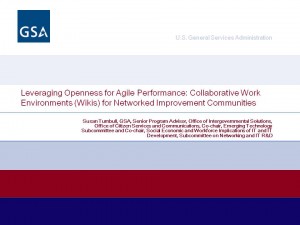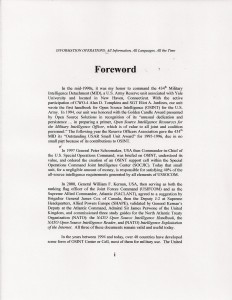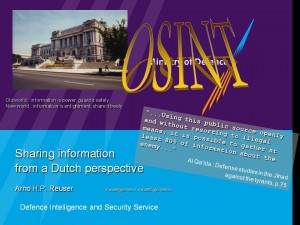
2006 Sutton (US) Global Coverage, Looking Backward, Looking Forward
Briefings (Core), Budgets & Funding, Collaboration Zones, Communities of Practice, Historic Contributions, Key Players, Policies, Strategy, Threats
Boyd Sutton was one of a handful of great intelligence community leaders who understood how to handle and get the most out of what CIA described as “self-starters” (they have up the idea after half of both classes quit within give years–go along bureaucrats are still the norm). He also had a huge mind, and went form being in charge of the Director of Central Intelligence (DCI) vault dealing with all external technical programs (the Advanced Program and Evaluation Group) to being a senior executive at the National Reconaissance Office (NRO), and then a retiree consultant charged by then DNI George Tenet with establishing the requirements for Global Coverage–the answer: $10 million for each of 150 “lower tier” countries and issues including non-state actors and emerging threats, or $1.5 billion a year year–today that would be $3 billion. Boyd's contribution of the unclassified version of his study to the public, in the public interest, is a significant example of individual integrity in the service of the Republic.

Click on the Frog to connect to his original 1997 study slides and full text, all unclassified as released.

2006 Turnbull (US) on Collaboration & Sharing
Historic Contributions2006 Yekelo (ZA) Continental Early Warning & Information Sharing: A Military Perspective on Deterring & Resolving Complex Emergencies
Communities of Practice, Cultural Intelligence, Historic Contributions, Peace Intelligence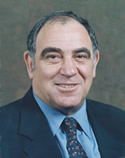
South Africa, Military and Civilian Intelligence Community
IOP '06 Under the general leadership of Minister of Intelligence Services Ronnie Kasrils, in partnership with an extraordinary collection of individuals across all elements of the South African intelligence community, and across all countries in the continent of Africa, successfully implemented both an open source software strategy, and an early warning and open source information sharing strategy. Their continental initiative, in its openness, low cost, and mutually beneficial architecture, sets the standard for multinational, multiagency, multidisciplinary, multidomain information sharing (M4 IS).
When Nelson Mandela ended arpartheid and an integrated government was formed, the very best of the revolutionaries of color went into intelligence. President “JZ” Zuma of South Africa is himself director of intelligence for the ANC in exile and resistance. They inherited a brand new campus built by the previous regime, and the South African National Academy of Intelligence (SANAI) has proven to be both an internal and a continental asset. It introduced Open Source Intelligence (OSINT) in the 1990's, and understood far sooner than most that OSINT and the traditional secret collection disciplines have to interact “as with a DNA spiral” in the words of the Director General of National Intelligence at the time.

Representing Minister Kasrils at OSS '06 was Brigadier General Gordon Mzwandile Yekelo, Director, Doctrine Development, Joint Operations Division, South African Armed Forces, who shared his views on “Continental Early Warning & Information Sharing: A Military Perspective on Deterring & Resolving Complex Emergencies.” Today, in 2009, SANAI is about to offer world-class training to the eight tribes of intelligence across all of Africa, and with integrity and persistence, may yet create a Smart Continent Of, By, and For Africans.
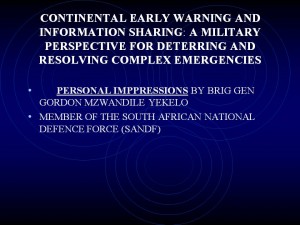
2006 Simmons (US) Policy Preface to Information Operations (IO) Book
Historic Contributions, LegislationCongressman Rob Simmons got into the Open Source Intelligence (OSINT) arena in 1995, and grew to understand vastly more than those serving in the U.S. Government, then or now. He was among the first if not the only Member to recognize that Information Operations (IO) was the totality of the information and intelligence spectrum, encompassing not just “intelligence” but also logistics, friendly force information, and all other information. He understood the Special Operations Command point of view: “Secret intelligence is 10% of All-Source Intelligence; and All-Source Intelligence is 10% of Information Operations.” Below is his Foreword to the first book on IO to be written from an intelligence foundation but with a World Brain perspective.
2006 House Appropriations Committee Public Law 109-163 6 January 2006 Section 931 Department of Defense Strategy for Open-Source Intelligence
Historic Contributions, Legislation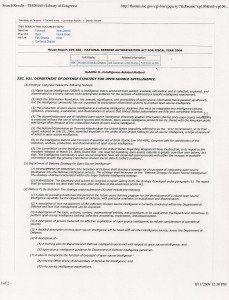
Here is a summary of what Congress demanded from DoD that has not been provided to date:
1) A plan for providing funds
2) A description of management now and as it could be improved
3) A description of tools, systems, centers, organizational entities amd procedures
4) A description of proven tradecraft including operational security
5) A description of OSINT fusion with other disciplines
6) A description of a training plan and guidance for DoD intelligence personnel
7) A plan to incorporate oversight of OSINT
8) A plan to incorporate the OSINT specialty int oall existing DoD personnel systems;
9) Aplan to utilize reserve personnel; and
10) A plan for the use of the Open Source Information System (OSIS).
2005 Simmons (US) Puts Open Source Intelligence (OSINT) into Intelligence Reform Legislation
Government, Historic Contributions

Representative Rob Simmons (R-CT-02) Obtains 417 House Votes In Favor of Open Source Intelligence (OSINT) as Essential Part of Reform Effort
WASHINGTON, June 26 /PRNewswire/ — According to Robert David Steele Vivas, CEO of OSS.Net, Inc., a global commercial intelligence corporation, “Representative Rob Simmons is going to be a vital contributor to Congressional deliberations on reform of the U.S. Intelligence Community.” The House of Representatives passed by a vote of 417 to 1 his amendment to bolster our national security and strengthen our nation's intelligence capabilities. The Simmons amendment directs the Director of Central Intelligence to focus on the importance of Open Source Intelligence (OSINT), and report to Congress in six months on the progress being made in using this under-utilized intelligence discipline. The lawmaker's amendment was incorporated into H.R. 4548, the “Intelligence Authorization Act for Fiscal Year 2005,” which passed the House by a vote of 360-61. According to Steele, “The Simmons amendment enables a conference discussion on OSINT, and makes possible the establishment of a national OSINT program as part of the final legislation. We who have advocated OSINT reform since 1988 are explicitly seeking $125 million per year for an independent field activity of the Department of Defense, with $10 million per year multinational OSINT collection centers in each theater of operations.”
“The ‘information explosion' has dramatically increased both the quality and quantity of the information available in the public sector,” Simmons said. “Because this information is unclassified, it can be shared quickly and freely, and acted upon. Unfortunately, our country's intelligence service has under-utilized OSINT. The time has come to revisit the importance of Open Source Intelligence. It not only saves time and money, it saves lives.”
ABOUT CONGRESSMAN ROB SIMMONS: Congressman Rob Simmons served 37 years in the U.S. Army, starting as a Private and retiring in 2003 as a Colonel. He earned two Bronze Star Medals for his service in Vietnam. He is one of only two Members of Congress with clandestine experience, serving ten years in the CIA's Directorate of Operations. He worked with Senator Barry Goldwater and with Bill Casey from 1981-1985, while Staff Director of the Senate Select Committee on Intelligence. He is a member of the House Armed Services Committee. His press representative is Meghan Curran, who can be reached at (202) 225-2076.

